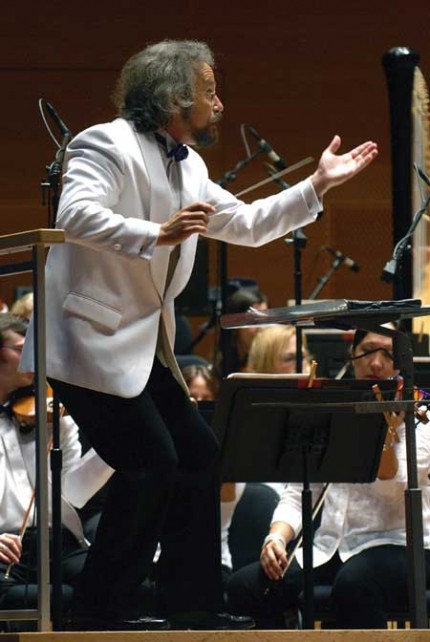Kalmar, Grant Park Orchestra and Chorus spark a genuine storm in festival opener

The cancellation of the Grant Park Music Festival’s season-opening concert Wednesday night was a disappointment for all. Especially irksome was the fact that the city’s decision-makers pulled the plug on the show unnecessarily, putting too much credence into overhyped weather reports that had little effect on downtown Chicago.
Friday’s night concert at the Pritzker Pavilion was not planned as the opening event, but with the Grant Park Chorus joining their orchestral colleagues in a program that played to Carlos Kalmar’s considerable strengths, the evening serendipitously made an outstanding kickoff to the lakefront festival’s 79th season. The program will be repeated tonight and should not be missed.
There are few, if any, conductors currently before the public that can equal Carlos Kalmar in American music, as shown by the bracing excerpts from two homegrown ballets that opened the concert.
Medea’s Meditation and Dance of Vengeance derives from a Medea ballet written by Samuel Barber for Martha Graham. The concise orchestral tone poem he extracted from the music progresses from a bleak inward concentration to the murderous Medea’s climactic final frenzy.
Kalmar brought out the dark strangeness of the austere opening with its dry percussion, the al fresco bird cries and ambulance wails somehow adding to the unsettled ambiance. Judith Kulb’s sinuous English horn solo segued into a syncopated, Bernstein-like passage given driving vehemence by Kalmar and the orchestra. Under Kalmar’s exacting direction, the ensemble handled the complex cross-rhythms with crackling virtuosity, rising inexorably to the bravura coda depicting Medea’s unhinged fury.
Like many once-popular American works of the mid-20th century, Aaron Copland’s Billy the Kid seems to have been shot out of the canon, with contemporary orchestra programmers preferring the composer’s later masterpiece Appalachian Spring to Billy the Kid or Rodeo.
Still, as Friday’s idiomatic, rich-textured performance showed, there’s much more to Billy the Kid than a medley of cowboy songs. Kalmar brought striking breadth and weight to the introductory chords, Copland’s open fifths a timeless sonic portrait of the great expanse of the western prairie. There was terrific snap and rhythmic acuity to the running gun battle, and the playing caught the tartly satiric touch of Copland’s retooling of his populist material, as well as the deep vein of sadness in his wistful lyricism. The final reprise of the opening music had an unmistakeable valedictory expression, conveying a sense of the final page being turned in the saga of the outlaw as well as the closing of the American frontier. Played with great vitality and panache and conducted with deep understanding by Kalmar, Friday’s revelatory performance made one appreciate anew this underrated work.
Kalmar is also at his best in Russian/Slavic choral works, as shown by the closer, Prokofiev’s Alexander Nevsky.
The cantata Prokofiev drew from his score for Alexander Nevsky has worn much better than the Sergei Eisenstein Soviet film about the 13th-century Russian hero for which it was written. Under Kalmar’s vital direction, the Grant Park Orchestra blazed through this challenging score with full-blooded playing across all sections, the whipcrack orchestral effects including a virtuosic xylophone solo and mournful tenor saxophone making their impact.
But Nevsky is also a showpiece for voices and, in their first outing of the summer, the Grant Park Chorus made a magnificent showing. Scrupulously prepared by chorus director Christopher Bell, the gifted ensemble brought what sounded like idiomatic Russian pronunciation to the text as well as a dark, echt-Russian corporate sonority. The triumphant final section of Alexander’s victorious entrance into Pskov was overwhelming in effect.
The performance also gained by having a terrific soloist. The “Field of the Dead” section rarely comes off, but mezzo-soprano Emilia Boteva made it a highlight of the evening. The Bulgarian-born singer’s deep Slavic timbre proved ideal in this brooding music, her sensitive vocalism casting a spell in the mournful elegy for the battlefield dead.
The program will be repeated 7:30 p.m. Saturday. Admission is free. grantparkmusicfestival.com
Posted in Performances


